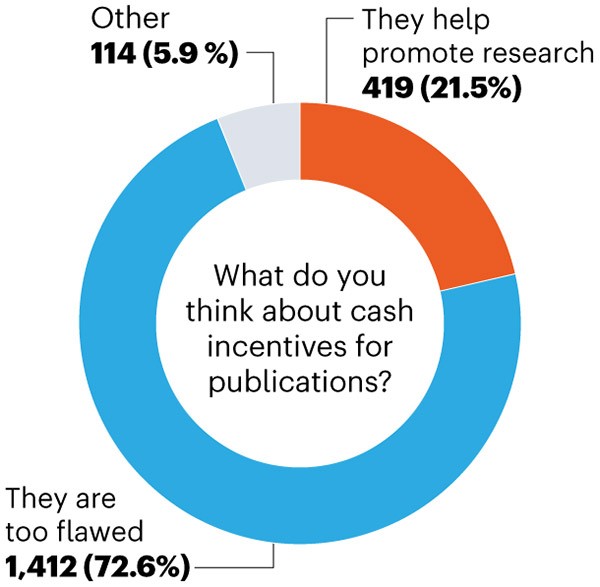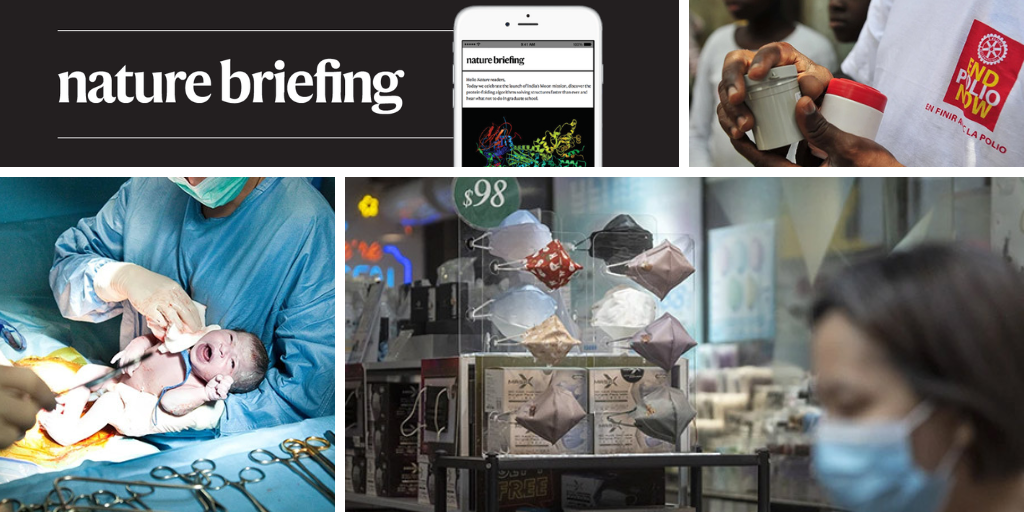Hello Nature readers, would you like to get this Briefing in your inbox free every day? Sign up here.

A pedestrian passes a shop selling face masks in Hong Kong.Credit: Vernon Yuen/NurPhoto via Getty
A controversial ‘challenge study’ of people who were intentionally infected with the SARS-CoV-2 virus provides a wealth of insights into viral transmission. It shows, for example, that a select group of people are ‘supershedders’ who spew many more virus particles into the air than do others. It also found that most people had already experienced mild symptoms by the time they tested positive — before they were emitting a detectable level of virus into the air. This means that if people test as soon as they notice symptoms, rapid tests “can be a powerful tool” for controlling viral spread, says infectious-disease researcher Christopher Brooke.
Reference: The Lancet Microbe paper
Evidence is growing that swabbing babies born by caesarean section with their mother’s vaginal fluids to encourage the development of a microbiome is safe — and might improve brain development. The biggest study of the practice so far found that swabbed babies achieved a slightly higher number of neurodevelopmental milestones by the ages of three and six months than did babies born by c-section who did not receive the treatment. More research is needed to determine whether these differences will be meaningful or lasting, say scientists.
Reference: Cell Host & Microbe paper
Upgraded polio vaccines could help stamp out the disease once and for all. Wild polio has almost been eradicated, but a version of the virus that arose naturally from the weakened poliovirus used for vaccinations can spread in areas where many children have not been immunized. Researchers genetically stabilized the virus in the orally administered vaccines to slash the likelihood that it will re-evolve virulence. The vaccines have been tested in mice; human trials are next.
The development of better vaccines is only part of the answer when it comes to eradicating the virus, argues a Nature editorial. Disruptions to polio campaigns — because of the pandemic, political instability and organizational changes in how campaigns are run — have led to a rise in the number of outbreaks. “New vaccines will not work if they remain in their vials,” says the editorial.
BBC | 4 min read & Nature | 6 min read
Reader poll

Last week, we learnt that Tanzania will join other countries in awarding money to researchers who publish in high-impact journals. China recently ended the practice after many decades.
When we asked readers what they thought about cash-for-publication, only 21.5% thought such programmes help to promote research. Almost 73% felt the incentives were too flawed. Many worried that such initiatives encourage metrics-chasing or fraudulent practices.
Moreover, the money often rewards those who have already made it to the top, rather than encouraging those at earlier career stages, readers pointed out. Cash incentives tend to promote collaborations in which most of the work is done abroad instead of fostering local scientific development, adds Adolfo Rivero-Müller, a biochemist in Poland, another country with an incentives scheme.
In South Africa, where money for science is tight, incentives play a significant part in how research is funded, says physicist André Strydom. The cash is managed so that it can be used only for research, he explains.
Still, such policies could signal that basic or niche research that is unsuitable for the highest-impact journals is somehow less valuable, suggests geologist Chris Schneider.
Features & opinion
A networking activity called speed geeking can tackle power imbalances at conferences. Speakers, or geeks, deliver five-minute talks to small groups seated around a table. When the time is up, the geeks rotate to the next table and repeat the process. This creates a conversational dynamic, rather than a feeling of people being ‘talked at’, suggest a group of five researchers. They share their tips for an effective speed-geeking event:
• Contact conference organizers well in advance to secure a space in the programme and to advertise the session
• Run the session on the first day to maximize impact and minimize cost
• Include geeks from diverse backgrounds
• Work out logistics and timings in advance
Evolutionary geneticist Aashish Jha and his team work with foraging communities in Nepal to explore the link between the gut microbiome and stunting, a condition in which children do not reach their full growth potential. The researchers also train local nurses and provide scholarships so that girls can go to school. “Researchers who study marginalized communities should find a way to give something back to society,” says Jha.
A sentient world-ship grapples with whether to reveal the truth to her inhabitants in the latest short story for Nature’s Futures series.
Within two years, quantum computers might be able to beat conventional ones at useful tasks. IBM’s 127-qubit quantum processor has now simulated the behaviour of a magnetic material. Regular machines would struggle to keep up with these calculations. “They expect that in a couple of years, when they start doing this kind of thing with more than 1,000 qubits, there will be a stage where there clearly is an advantage,” Nature reporter Davide Castelvecchi tells the Nature Podcast. Crucially, IBM managed to reduce quantum noise — a major obstacle to reliable results — using error mitigation instead of error correction.
Nature Podcast | 30 min listen
Subscribe to the Nature Podcast on Apple Podcasts, Google Podcasts or Spotify.







More News
Author Correction: Stepwise activation of a metabotropic glutamate receptor – Nature
Changing rainforest to plantations shifts tropical food webs
Streamlined skull helps foxes take a nosedive